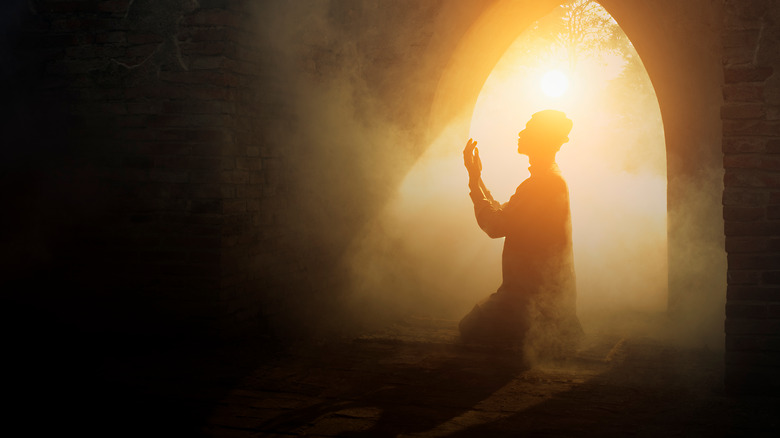What's The Real Difference Between A Cult And A Religion?
In one of the most famous sentences ever written in a legal opinion, Supreme Court Justice Potter Stewart once said, of what constitutes "hard core" pornography, "I know it when I see it" (per Yale Law School). Stewart was effectively saying that some things are difficult to categorize and explain with words on a page (or pixels on a screen, half a century later), but that those same things are blatantly obvious to the human mind.
In a way, the same thing can be said of the differences between a cult and a religion. Baltimore Sun writer Sam Fleischacker noted in 2011 that most people, when asked where the line is between cult and religion, would say that there is one, but they can't express where it is; in other words, "I know it when I see it."
Complicating matters is the fact that one man's cult is another man's religion, and vice-versa. Some consider groups such as the Church of Jesus Christ of Latter-day Saints and the Jehovah's Witnesses as cults, while the practitioners of those faiths consider them mainline religions. What's more, characteristics of cults, such as charismatic leaders or beliefs that challenge established orthodoxy, were at one time true of belief systems that are now mainstream religions. "(M)any scholars choose to avoid the term 'cult' altogether," as Zoë Heller wrote last month in The New Yorker.
The difference between a religion and a cult is at once a matter of "I know it when I see it," as well as a matter of whom you ask.
Religions stand the test of time; cults do not
Baltimore Sun writer Fleischacker, a professor of philosophy at the University of Illinois-Chicago, says the difference between a religion and a cult is "about 100 years." He notes that at one time, Islam and Christianity were both considered cults; now, of course, they are considered mainstream religions — the two most dominant religions in the world, according to Pew Research Center. Similarly, Quakers and Baptists were at one point considered cults.
All of these religions, at least at the beginning, checked off the boxes that would define a cult: a charismatic leader who claimed to have direct access to the divine (such as Jesus Christ or, later, Joseph Smith, as Tina Rodia notes in Penn Today), a belief system that challenged established orthodoxy, and the like. However, all have survived the centuries.
Cults, on the other hand, fail to last. Some have ended in mass suicide. Others have promoted unhealthy or abusive practices, and even direct their members to attack others. Still other cults have practices that antagonize younger members, driving them away. In short, cults tend to fall apart under their own weight, while religions tend to grow and, over the decades and centuries, become established, mainstream faith movements.
Another possible definition of the difference between a cult and a religion is widespread public acceptance and, in particular, governmental intervention.
Widespread public opinion plays a part, too
As Tina Rodia writes in Penn Today, the media can play a significant role in how a movement is perceived by the general public. For example, discussion of the Jonestown incident was often accompanied by pictures of dead bodies. "Cult" is often attached to "UFOs," "personality," and "racist."
Public opinion can and does play a role in the difference between a cult and a religion, with the masses taking their cues from both the media and from their own religious leaders, writes Rodia. And mostly, movements get the "cult" label if they're tied to violence, suicide, or self-harm, she says.
Finally, there's the matter of government intervention. The U.S., by and large, is not in the business of regulating religion — except when it comes to taxes. The Church of Scientology may be considered a cult by some, but according to the U.S. government it is a religion, as evidenced by the fact that it enjoys tax-exempt status. Over in China, where the government has no qualms about regulating religion, the Falun Gong movement was at one time a popular religion. Then it got too big for the communist Chinese government to be comfortable with, was labeled a cult, and overnight it went from widespread acceptance to a cult to be feared. Though the fact that Falun Gong opposes the Chinese communist government might have something to do with it, too (per CNN).


